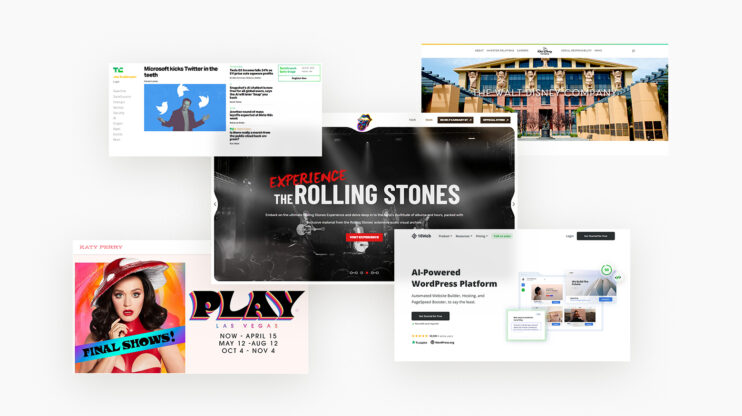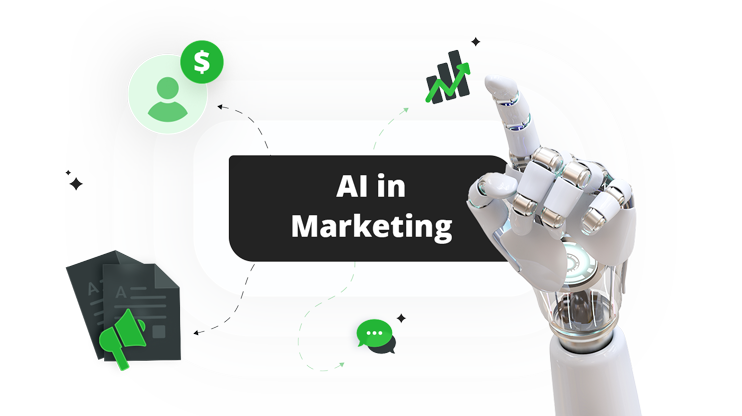
Artificial Intelligence is revolutionizing marketing as we know it. However, instead of viewing it as a disruptive threat, marketers should leverage it as a tool to continue to adapt to evolving customer expectations. In this article, we’ll provide you with a complete introduction and overview of AI-driven marketing, including introducing you to practical and effective AI marketing examples that you can emulate in your business today. You’ll also find some of the best AI marketing tools to consider using.
Like it’s doing elsewhere, Artificial Intelligence (AI) is revolutionizing marketing as we know it. However, instead of viewing it as a disruptive threat, marketers should leverage it as a tool to continue to adapt to evolving customer expectations. In fact, in consumer-facing industries, AI has the most value to offer sales and marketing than any other field.
At its core, marketing is about identifying consumers and understanding their needs, matching them with suitable products and services, and persuading them to convert. It turns out, these are all things AI is exceptionally good at.
AI has the potential to help deliver personalized experiences, optimize campaigns, and stay ahead of the competition. In doing so, businesses will increase conversions, better focus their resources and enhance customer experiences through personalized messaging and recommendations – all of which can only be good in the long run. Not to mention augment the abilities of their employees by automating routine tasks, gathering insights from vast amounts of consumer data, and scaling up campaigns.
Don’t believe us – 52% of AI high performers are planning to increase their AI spend, showing the value that they see in the technology. And, according to Deloitte, 3 out of the 5 top AI objectives were marketing oriented.
Even if you believe in the power of marketing artificial intelligence, it can be intimidating to get started. There are so many technologies, tools, and techniques to get to grips with that it’s hard to know where to begin.
In this article, we’ll provide you with a complete introduction and overview of AI-driven marketing. We’ll look not only at the trends driving AI adoption but also at the benefits, challenges, and impact of making AI part of your marketing strategy.
You’ll also find some inspiration in the form of real-life AI marketing examples with a list of tools to consider.
In This Article
- What is AI or AI-driven marketing?
- The current trends of Artificial Intelligence in marketing
- The benefits, impact, and challenges of using AI in marketing
- How to create a marketing strategy by making the best use of AI?
- AI marketing examples: general use cases
- AI marketing examples: field-specific use cases
- Top 5 highly-recommended AI marketing tools to catch up with
- Conclusion
- FAQ
What is AI or AI-driven marketing?
Artificial Intelligence (AI) is a branch of computer science that deals with the development of machines that can perform tasks that typically require human intelligence, such as learning, reasoning, problem-solving, and decision-making.
AI-driven marketing relies on various technologies to help streamline and improve marketing processes and support human activities. For example:
- Machine learning algorithms that analyze customer data to identify patterns and predict behavior
- Chatbots that use natural language processing to communicate with customers
- Personalized marketing campaigns that are tailored to individual customer preferences.
AI marketing systems can make automated decisions based on data collection, data analysis, and additional observations of consumer trends that have an impact on marketing efforts. These tools vary widely in their complexity and capabilities, from simple automations that can independently execute repetitive tasks to highly intelligent systems that can augment, or replace, human decision-making on a strategic scale.
The current trends of artificial intelligence in marketing
AI is already widely used within digital marketing today. However, these are still mostly restricted to handling relatively basic tasks, such as:
- Programmatic buying/digital ad placement
- Sales forecasting and improving the accuracy of predictions
- Enhancing customer service by augmenting the abilities of human actors
That being said, these well-established applications already span every stage of the customer journey. From helping to identify and qualify potential leads based on their browsing behavior to delivering personalized conversion-driven messaging at checkout.
Related Articles
As AI for marketing matures, the trend is clearly toward fully integrated systems. According to the same Deloitte survey, 74% of AI execs agree that AI will be integrated into all enterprise applications within three years.
We will also see AI’s role continue to grow in its traditional applications, including:
- Content generation: AI text, image, video, and other content-generating tools are proliferating at a rapid rate. As their capabilities improve, more will use them to automatically create unique content for marketing.
- Personalization: This will evolve from simply delivering personalized content to personalizing the entire customer journey. AI is also empowering more businesses to exclusively use first-party data for personalization.
- Conversational AI: Large language models (LLM) are becoming more viable and accessible than natural language processing (NLP) models thanks to the vast amounts of data they can be trained in. This is leading to increased investment in AI chatbots and similar tools.
- Voice commerce: Voice assistant transactions are expected to increase significantly in the coming years due to wider adoption and improved voice recognition capabilities.
- Visual, AR, and VR shopping: 90% of consumers have, or would, use AR shopping tools, while 98% have found them useful. This technology still has a lot of room to mature, which means there is plenty of opportunity for growth.
- Content personalization and predictive analytics: Customer insights account for 56.5% of all AI implementations, making it the most widely adopted marketing AI.
The benefits, impact, and challenges of using AI in marketing
So, why is the hype around AI in marketing, and why does it seem like everyone is rushing to implement it? Well, the simple answer is that it can lead to all of these benefits:
- Improved personalization: AI can collect and analyze vast amounts of data much more efficiently than humans. It can create personalized experiences for individual customers, improving customer satisfaction and retention.
- Predictive analytics: Marketers can leverage data analytics to make more accurate predictions about customer behavior. This allows them to fine-tune digital marketing and sales strategies based on ideal pricing, product and service offerings, etc.
- Streamlined customer service: Chatbots can provide instant assistance with basic queries or streamline the process for support staff by narrowing down user issues.
- Cost and time efficiency: AI is already being used to automate many back-office tasks. This reduces unnecessary manual labor costs and increases the speed of processes.
- Improve user experiences: 71% of users expect personalized recommendations and 76% are frustrated by a lack of them. AI can address this by helping users find what they want faster and with less hassle.
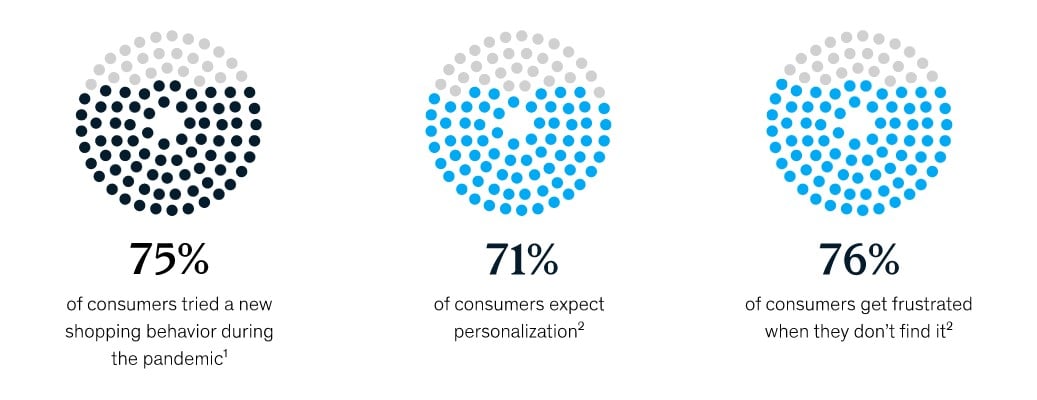
If AI leads to all these benefits, why have only 19% of enterprises adopted AI for B2C personalization? Despite its promise, there are certain barriers to entry some businesses face:
- AI systems need high-quality data to be effective, but it’s hard to sanitize and organize huge amounts of data
- Data privacy and security are ever-present concerns when collecting and using consumer data. Businesses must ensure that their AI models are in compliance with privacy regulations, such as the GDPR and CCPA.
- It can be a complex and time-consuming process to integrate new AI systems with existing business and marketing solutions, like CRM.
- B2C and B2B businesses often have trouble attracting top talent to implement and manage AI in marketing.
- Some have ethical concerns about bias in AI models and the information they are trained on, which can lead to discrimination.
- Although costs are rapidly falling, they can still be expensive and hard to justify, particularly for smaller businesses.
If businesses can overcome the challenges and realize the benefits, the positive impact on their business can be transformative. According to Deloitte, 45% of seasoned adopters believe AI gives them a significant competitive advantage. McKinsey estimates that marketing in AI will have a total impact of $1.4 Trillion to $2.6 Trillion across all marketing and sales functions.
How to create a marketing strategy by making the best use of AI?
Each company will need to develop a unique AI marketing strategy to ensure optimal business outcomes for its unique situation.
Most companies are taking the “crawl-walk-run” approach to ease into becoming more and more reliant on AI. This starts off with deploying AI in stand-alone applications, where integration may seem difficult or impossible.
What follows is a basic step-by-step roadmap that companies can follow to develop their AI marketing capabilities:
| Step | Description |
| 1. Define challenges and goals | What are the specific business outcomes you want to achieve or challenges you want to solve in your current marketing pipeline? For example, lead generation, lead qualification, personalized content generation, last-mile conversion, or customer retention. |
| 2. Identify relevant data sources | This includes all data sources relevant to achieving your marketing goals, such as customer data, transactional data, or social media data. |
| 3. Assess your data quality | Evaluate the quality, quantity, and accessibility of your data. Ensure your data is clean, organized, and properly formatted so it can be used for AI analysis. |
| 4. Choose the right AI tools | This is dependent on what marketing goals you want to achieve. It may include everything from machine learning algorithms to predictive analytics to chatbots. |
| 5. Train your models | You can train AI on historical data to create accurate predictions and recommendations. |
| 6. Develop an AI team | You need to ensure that you have the relevant talent, skills, and expertise to manage and maximize the potential of AI technologies./td> |
| 7. Monitor and evaluate results | AI is a long-term investment that will evolve alongside the business. You will need to continually analyze its performance and make adjustments to optimize your strategy. |
| 8. Foster cross-functional collaboration | The future of AI is fully integrated systems across the entire organization. You need to ensure a more collaborative culture while also aligning all teams with the overall business objectives. |
AI marketing examples: general use cases
So, how does AI help businesses achieve these spectacular benefits? Below, we’ll cover some of the general use cases for AI in marketing. These use cases apply almost universally to all types of marketing campaigns, industries, efforts, different mediums, and stages of the sales lifecycle.
Marketing optimization
AI is already being used widely to optimize marketing campaigns. AI can measure the success of marketing campaigns (either AI or human-driven), conduct A/B-style testing, and identify the individual factors that contribute to the success or failure of a marketing campaign. This information can be used to identify what works and what doesn’t to make future campaigns more effective.
Combined with machine learning, AI marketing tools can train themselves to improve their marketing approach over time. For example, by adjusting their tone, messaging, level of personalization, market segmentation, or offers based on the results of previous campaigns.
Granular personalization
AI technologies can collect, organize, and analyze much larger data sets in much less time than humans. This allows it to identify and use a larger number of data points on each consumer in order to personalize marketing efforts to a much more granular level.
Even if you had this data at your disposal, it would not be viable to craft each individual email, message, or ad with this level of personalization using traditional methods. However, AI can generate personalized content at scale, allowing you to create unique experiences for each user.
One of the clearest examples today is how Netflix, and other streaming platforms, use AI to make personalized recommendations to their users.
However, some AI marketing examples of granular personalization go much deeper. Using the concept of atomic content, AI can be used to modularize units of marketing material. For example, a blog post can be broken into the title, featured image, text, related reading, FAQs, etc.
By analyzing user profiles, AI can mix and match content to optimize marketing materials for individual visitors. So, for the same webpage, one visitor might see the title ‘A’ with image ‘B’ and FAQ ‘C’, while another visitor sees title ‘B’ with image ‘A’, and FAQ ‘B’.
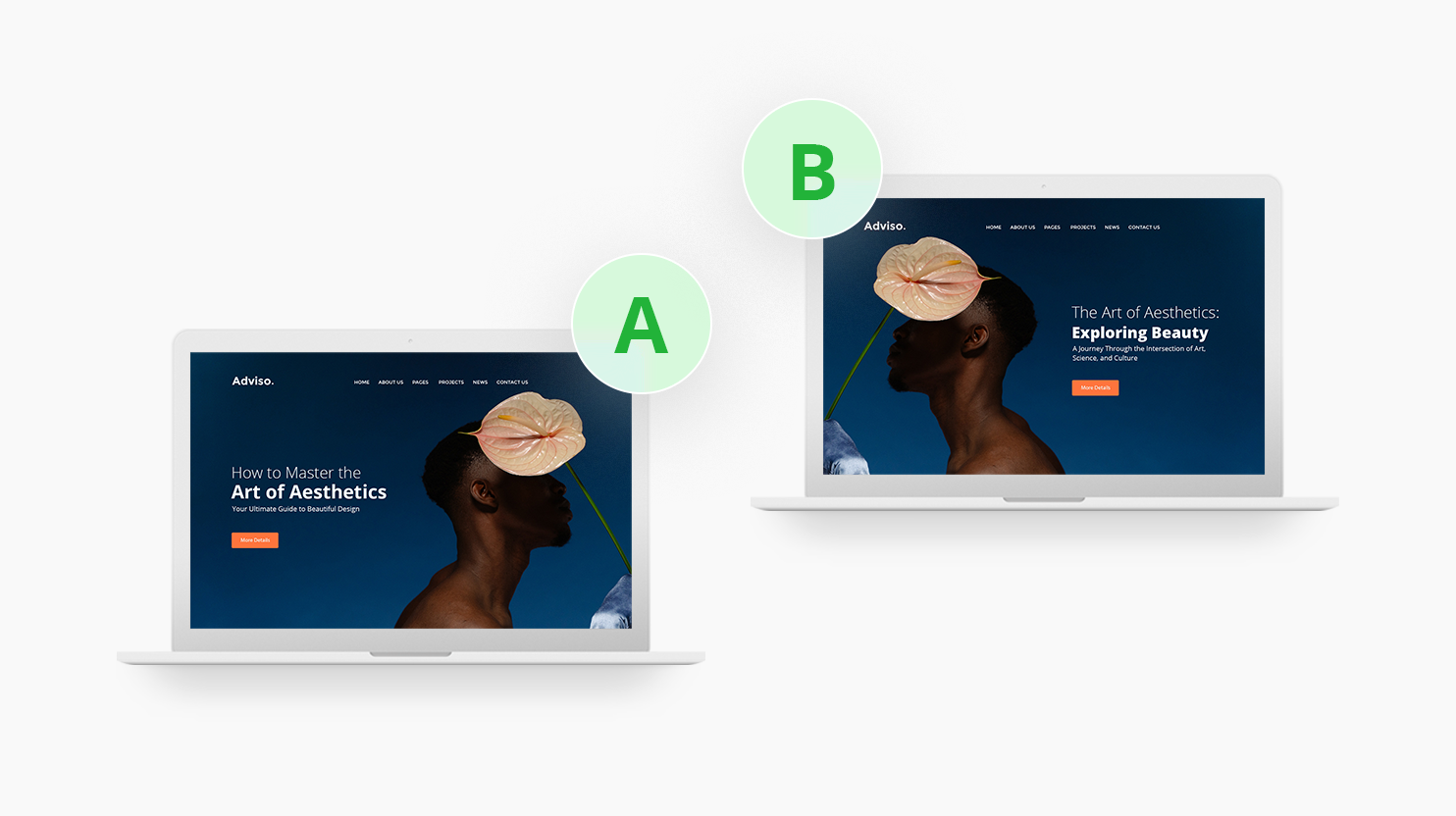
Marketing automation
AI can help with marketing automation across all facets. Some AI marketing examples for automation include tools that can be used to automate back-office tasks, like curating subscriber lists, emailing customers about abandoned shopping carts, and providing automated customer assistance.
These tasks are time-consuming but require some level of intelligence to complete, so they are not suited toward pure automation alone.
On the other end, AI can be deployed to scale marketing efforts by automating the processes of creating content, disseminating it to leads, placing ads, etc. This allows you to do more with less time and frees up your human resources for more strategic work instead of using their time on repetitive tasks.
Marketing analytics
AI is not only good for automating repetitive tasks but also for acting with greater speed, accuracy, and confidence where strong decision-making is needed. AI can make automated decisions based on data collection and analysis and by observing relevant trends. For example, Prelaunch.com’s AI Market Research Assistant collects customer data from the competitors, analyzes them and gives helpful insights on what your potential customers value in this kind of product, what they don’t want, and much more. Based on the insights, your decision-making turns much easier.
The results of this analysis can also be used by human decision-makers to improve their understanding of the situation when making vital strategic decisions. It can allow them to act much faster than if they had to carry out this analysis manually, but with the same level of confidence. This is essential to gain a competitive advantage in markets where speed is of the essence and conditions can change at any time.
You can learn more about the role of AI in market research in our related article.
Dynamic pricing
An effective pricing strategy is incredibly important to convert the targets of your marketing campaigns into customers. By incorporating AI into dynamic pricing, businesses can optimize their pricing decisions for maximum results.
AI marketing tools monitor market conditions, customer behavior, and competitor prices in real-time. This enables businesses to identify opportunities for price adjustments and stay competitive. By accurately forecasting demand patterns using historical data and external factors, AI tools empower businesses to dynamically adjust prices for optimal revenue during peak or low-demand periods.
Similarly, by analyzing customer data, businesses can understand individual preferences, purchase history, and price sensitivity. This allows for tailored pricing options and promotions, increasing the likelihood of conversions.
Combined with competitive analysis and testing, and optimization capabilities, it allows businesses to fine-tune their pricing strategies and maximize profitability over time.
AI marketing examples: field-specific use cases
Now that we understand broadly how AI is being used in marketing, let’s look at more specific use cases for how it’s being used in modern-day marketing efforts:
AI content marketing and SEO
AI can not only be used to generate content but also to optimize it according to SEO best practices. Even tools like ChatGPT can be prompted to apply specific SEO-oriented techniques to their content to make it more relevant to search engines.
Similarly, AI trained on SEO models can be used to analyze existing content and suggest optimizations. The Yoast SEO plugin is an example of this type of technology that’s already widely used in WordPress websites.
As NLP, NLG (natural language generation), and LLM models improve, AIs will be able to generate more engaging and natural-sounding text. This will help improve secondary SEO metrics, like time on page and bounce rates.
Google’s stance on AI-generated content is that it’s not against its guidelines. However, the search engine is always looking for ways to improve its ability to identify high-quality, engaging content.
Optimize your content SEO with AI!
Write and perfect original content and fix all SEO and readability errors 10X faster with 10Web AI Writing Assistant.

AI in advertising (media buying)
Using conventional tools, marketing teams often aren’t capable of altering their strategy in real-time based on new information and the latest consumer trends. AI can also help make smarter media buying decisions faster, with less human input through programmatic advertising.
One of the best AI marketing examples of this in action is Campbell’s, which used IBM’s Watson to generate personalized display ads featuring recipes based on a user’s geographical location, current weather conditions, and preferences. Doing the same level of research, creating recipes, and then finding users to show them to would not be viable using manual means.
The same principles can be applied to paid advertising. AI can optimize bids based on more factors than just user search terms by including demographics, like age, location, gender, etc. This allows companies to outcompete other advertisers by bidding on the most effective marketing channels at the most competitive prices.
Other benefits include automating the placement process, real-time design optimization, and fraud detection.
AI in affiliate and referral marketing
Through large-scale data analysis, AI is able to analyze relationships and generate high-quality connections with potential affiliates. Usually, this would require a tremendous amount of time and resource-intensive research.
AI can even be used to predict the potential long-term value of new affiliate partnerships or referral campaigns to decide if they seem worth it. It can track campaign performance in real time and either make or suggest optimizations to improve them with minimal downtime.
It also allows businesses to personalize their messaging to individual referrers or referrals to boost participation and conversion rates. Not to mention offer advice on how to optimize future campaigns for better outcomes.
AI in outreach (sales and PR)
As already mentioned, AI is a powerful tool for predictive lead scoring. If you believe in the 80/20 principle, then it will allow you to focus and prioritize the majority of your efforts on your most high-value, high-potential leads.
There are also many generative AI marketing examples that specialize in creating content for outreach campaigns, using channels like email, social marketing, or instant messaging. Using machine learning, some models can train themselves over time by analyzing user sentiment and success rates to optimize their messaging. AI can also monitor social feeds for mentions or potential PR opportunities to time outreach campaigns for maximum relevance.
AI analytics can be used to optimize other factors, like the optimal timing and tone for individual consumer profiles.
AI in email marketing
29% of marketers believe that email is their most successful marketing channel. Plus, you can get a return of $42 for every $1 you spend on email marketing campaigns.
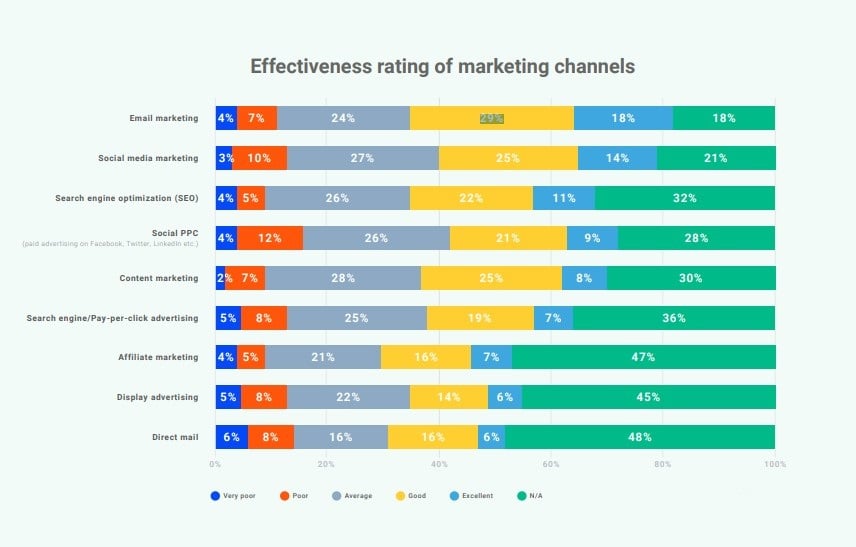
As such a high-value channel, it’s no wonder that specialized AI tools exist to take full advantage of it. These tools use typical AI-powered content generation and personalization to optimize the messaging for individual leads. However, they also come with tools to optimize the subject line to improve open rates and hook the reader.
Other capabilities include improved and fine-grained market segmentation to carry out more effective email marketing campaigns, as well as A/B testing to assess the success of and optimize future campaigns.
AI in social media and influencer marketing
Social media is a treasure trove of insights into the habits, needs, and interests of consumers. As mentioned, AI systems have the capacity to monitor social feeds 24/7 and track mentions, trends, or events relevant to your marketing efforts.
Some AI marketing examples also use public information on social platforms to create detailed consumer profiles and create hyper-targeted outreach campaigns via ads, email, or directly via social channels. Recognizing the potential for AI in social marketing, Facebook (Meta) has made numerous AI-based tools available on its platform.
Plus, there is also room for specialized AI-powered chatbots, sentiment analysis, content optimization, influencer identification, and ad targeting for social platforms.
AI in video marketing
There are many AI marketing examples of how the technology is being used to transform video marketing:
- Using generative AI to create scripts for marketing videos based on consumer analytics in much less time.
- Automatically generating video clips with text, speech, or image prompts. For example, realtors can use images of properties to create 3D representations with video walkthroughs.
- Personalize the content and delivery of video based on consumer analytics.
- AI tools to enhance the quality of videos by adding overlays or captions, improving audio quality, changing backgrounds, etc.
- Create virtual shopping experiences using AR/VR technologies. For example, this virtual try-on experience by watchmaker Baume Mercier or Farfetch and Snapchat’s collaborative campaign.
AI in consumer messaging
Another one of the groundbreaking AI marketing example is using it to tailor your website’s messaging to individual visitors. The best way to explain this is by looking at the real-world scenario regarding Netflix.
Netflix dynamically changes the artwork for titles in its catalog based on the user’s preferences and viewing history. For example, the show Pulp Fiction could show artwork that either features Uma Thurman or John Travolta, depending on whether a consumer has watched more shows that star either of these two actors:

This would be impossible to do at scale without the help of AI. And the same principle can be applied to any other type of content, from text to video clips.
AI chatbots
Chatbots aren’t just a customer support tool but can also be a powerful marketing asset. Some AI marketing examples that use chatbots include:
- Travel and hospitality: Sites like Booking.com let users find ideal properties by talking with chatbots. Eddy Travels offers an AI Assistant Chatbot to help customers find flights.
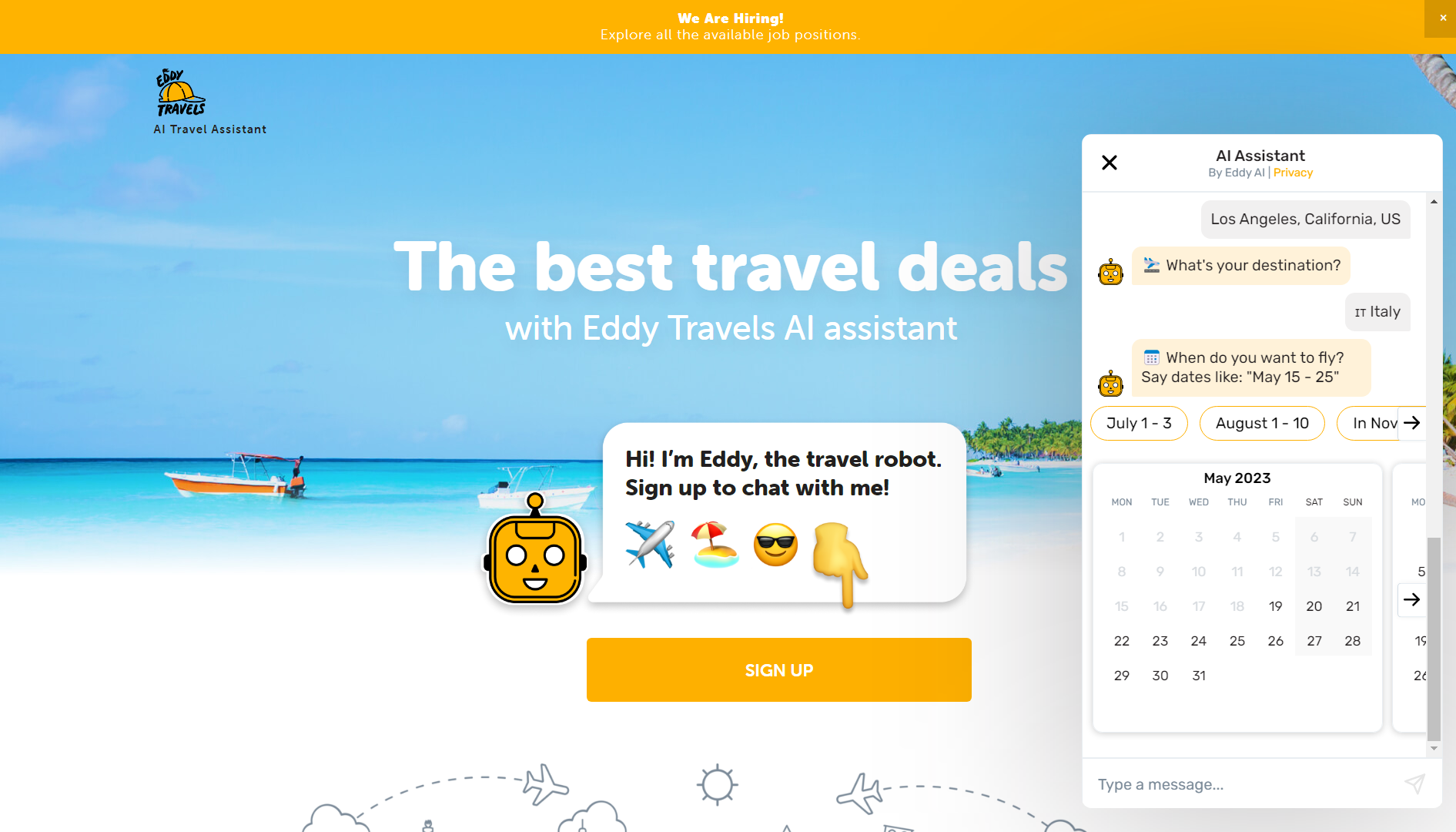
- Online delivery: Restaurants, delivery platforms, or grocers can provide customers with online menus and catalogs to order through a chatbot-like interface.
- Retail: Similarly, fashion or clothing retailers can simulate in-store concierge services through a chatbot.
Top 6 highly-recommended AI marketing tools to catch up with
The AI-driven marketing revolution is well and truly here. There are already thousands of products and services out there to help businesses boost their marketing efforts. Whether you’re a startup, small local business, or global enterprise, you’ll find AI marketing solutions that cater to your needs.
Some of these tools solve specific challenges, like generating, qualifying, and segmenting leads. Others help with specific marketing activities, like email outreach campaigns or generating optimized content for search engines.
10Web
While most of the attention today mainly falls on specific marketing tactics, a website is actually the most effective marketing tool for any business. 10Web offers a suite of AI-powered tools to ensure your business website is an effective platform for your marketing efforts.
The 10Web AI Website Builder can design and build an entire website based on just a short questionnaire about your business and website needs. It even generates marketing collateral, like page copy and images that would usually need to be sourced manually. All those materials become your own property once generated. Pages are responsive out-of-the-box so that you can easily tap into mobile markets.
The 10Web AI Writing Assistant is a generative tool that can automatically create content for your website pages and blog posts. You can also use it to analyze a text to detect and fix SEO errors or provide suggestions to improve SEO through keywords or better readability. It also integrates with the most popular SEO plugin for WordPress, Yoast.
Podcastle
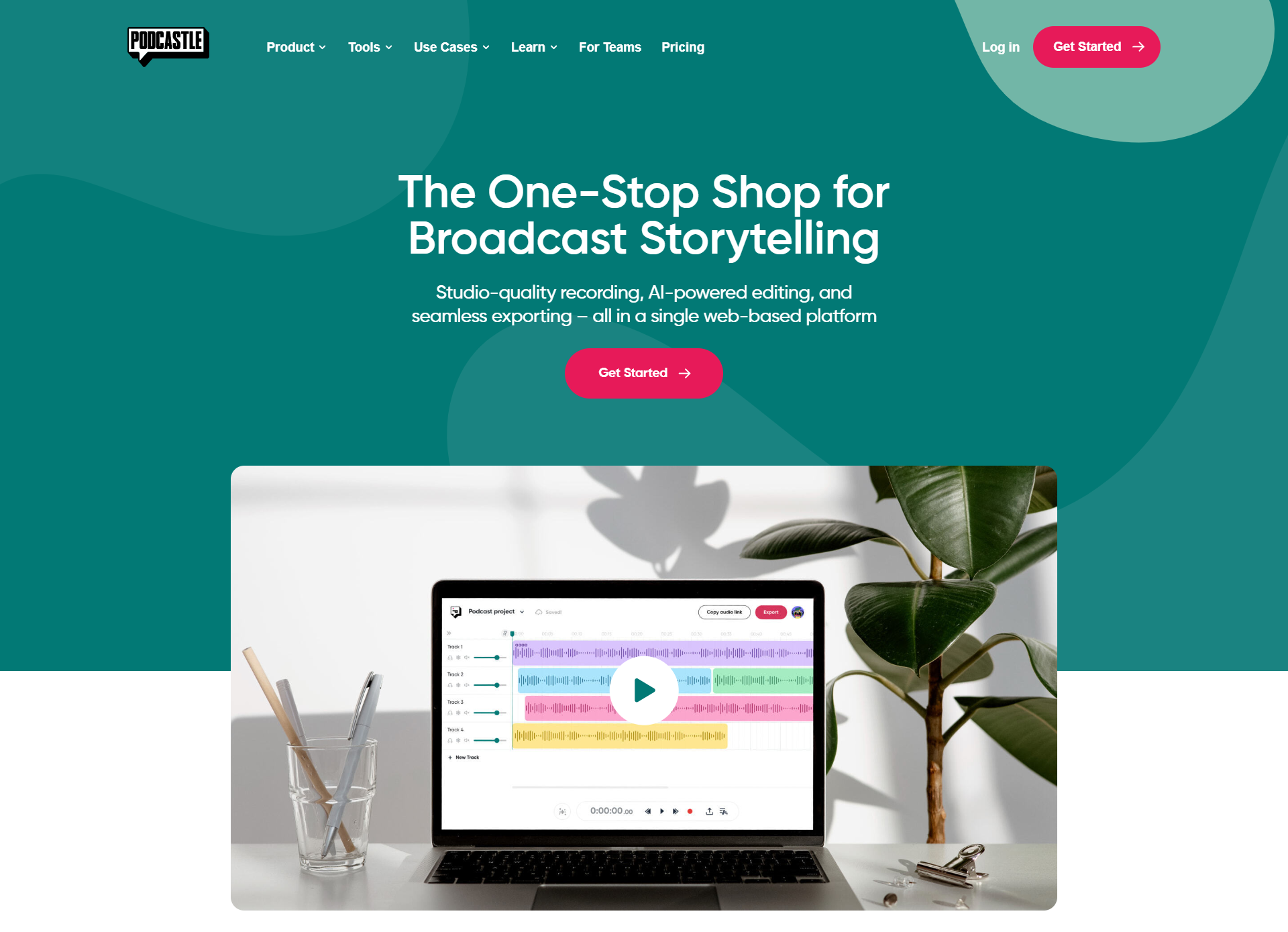
There are over 464.7 million podcast listeners worldwide, and 38% of them have bought products from podcast ads. It’s a budding industry, expected to exceed a market cap of $2.5 billion by 2024.
Podcastle offers a suite of AI tools to help create professional, studio-quality podcasts to compete with the 5 million other podcasts out there. It features background noise removal (called Magic Dust), automated transcription, auto leveling, and text-to-speech AI tools.
You can even modify the spoken audio in the podcast simply by correcting the corresponding text transcription. Podcastle offers realistic voice skins that will render any text in natural-sounding speech. The online audio editor also has various other tools to create, enhance, and edit audio.
AI Market Research Assistant by Prelaunch.com
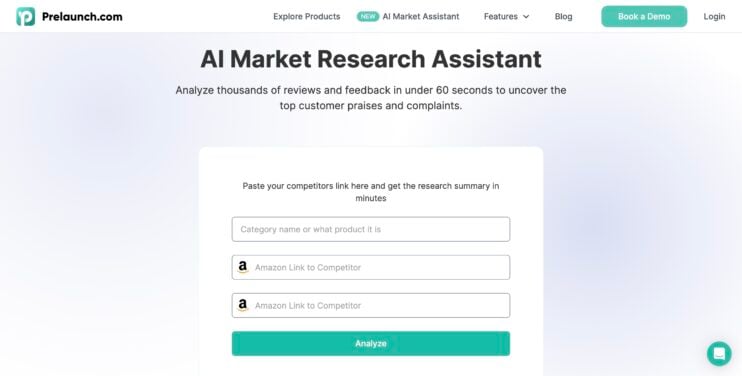
This tool helps retailers perfect their products by analyzing thousands of real customer comments on competitors’ Amazon listings.
It’s easy and simple. You just define your product’s category (what it is) and give two of your biggest competitors’ Amazon URLs.
In a matter of minutes, it returns the insights based on the analysis. The insights can include answers to important questions like:
- What’s the most liked or disliked feature,
- What’s the ideal customer persona,
- Price/Benefit relationship,
- Unique selling points, etc.
IBM Watson
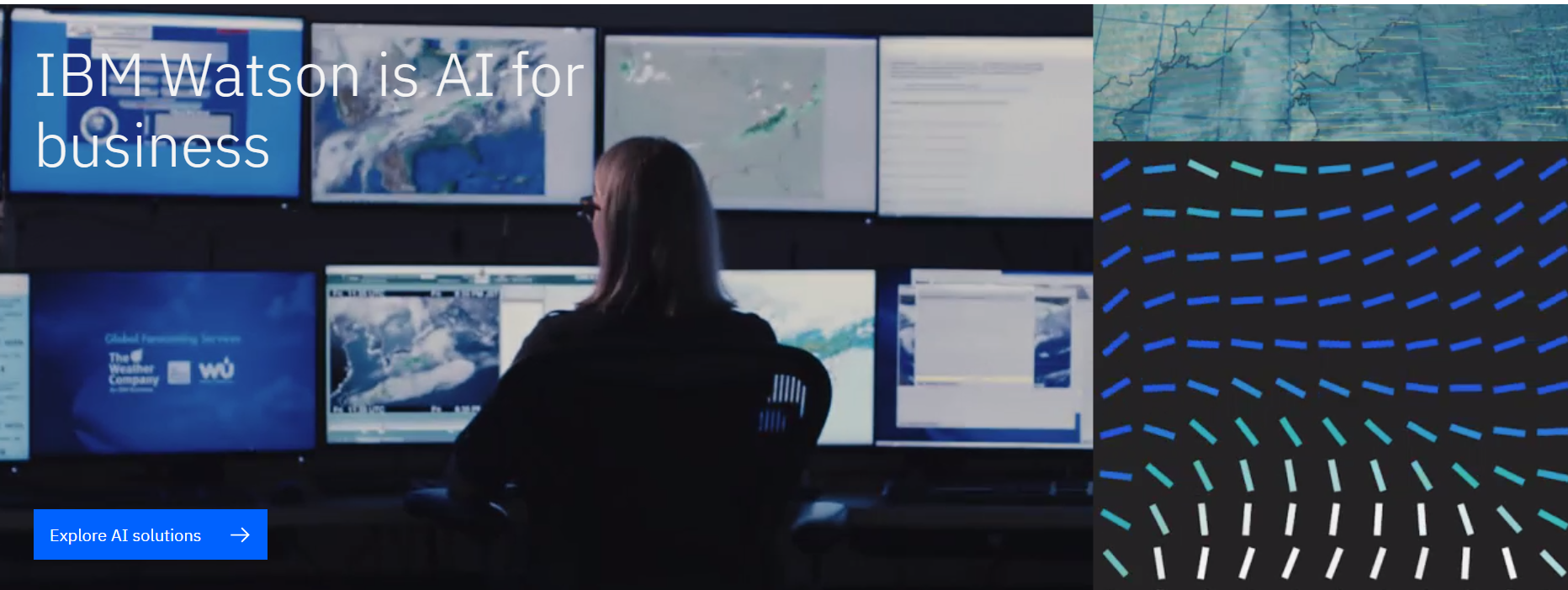
IBM’s Watson is an enterprise-grade AI that covers a variety of marketing tasks under a single platform. At its core, it’s a question-answering AI designed for businesses to perform analytics on vast quantities of consumer data.
It has been used by big names like GM Financial, Lufthansa, and Greenworks to organizations predict future outcomes, automate complex processes and optimize employees’ time.
Watson’s NLP and LLM technologies are trained on the unique language of specific industries and businesses. And they can extract insights from complex documents and data without any additional training or the guidance of a dedicated data scientist.
It also has AI-powered automation that can be applied to a wide range of business workflows and tasks.
SEMrush
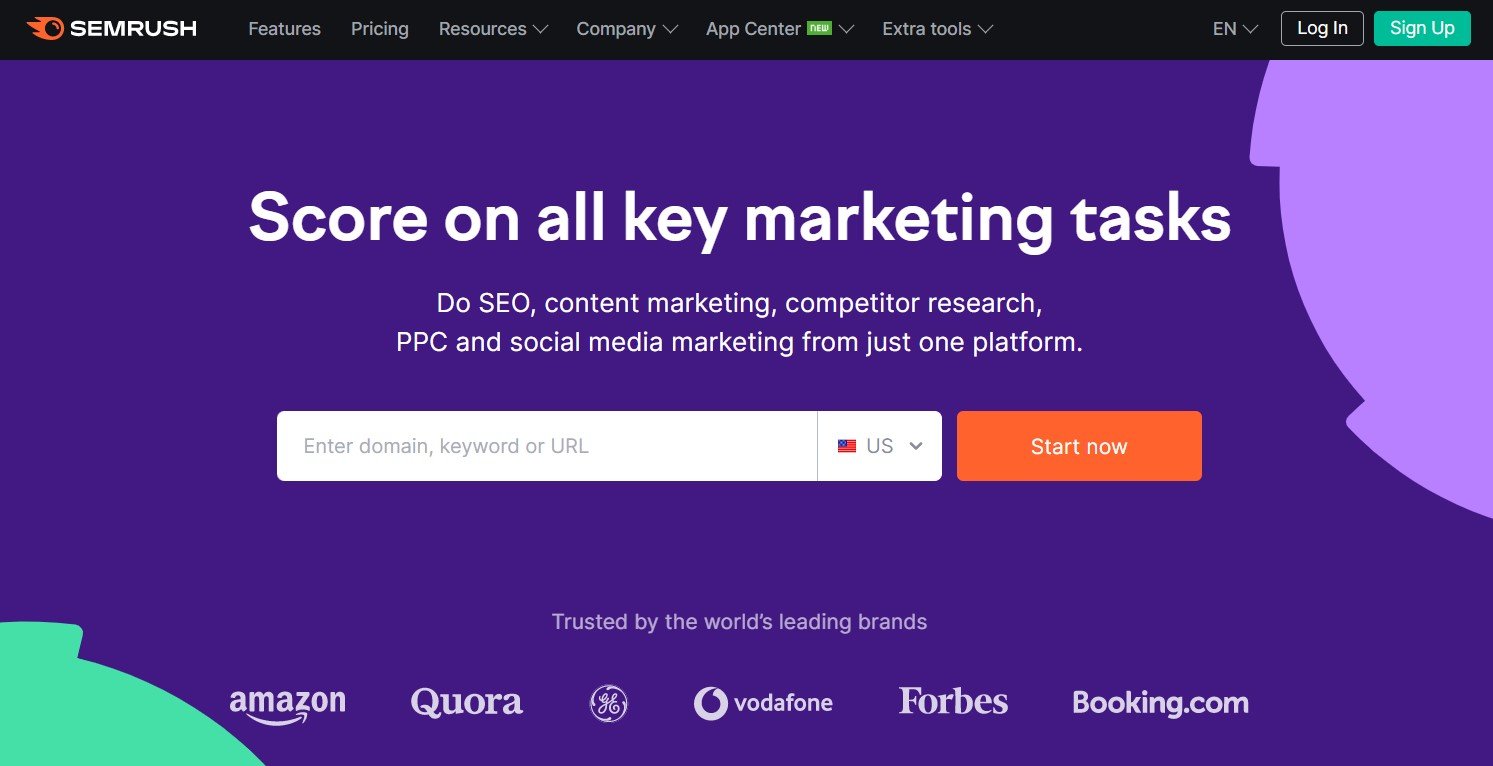
SEMrush is an all-in-one online marketing platform for SEO, PPC advertising, social media, and content. Its tools use AI to conduct competitor and market research, analyze existing content, and provide suggestions about how to optimize different content or campaigns for better results.
Some of its most popular tools are its AI-powered SERP page analyzer. This automatically identifies relevant search results according to your keyword and provides insights on trends and characteristics that make them rank highly. You can use these insights to create your own content based on the same topic with a text editor that offers suggestions on keyword and LSI usage to outrank competitors.
The SEO Writing Assistant also assists in content generation by:
- Analyzing readability and tone
- Expanding existing content
- Generating content from scratch
- Paraphrasing content
- Simplifying content
Seventh Sense
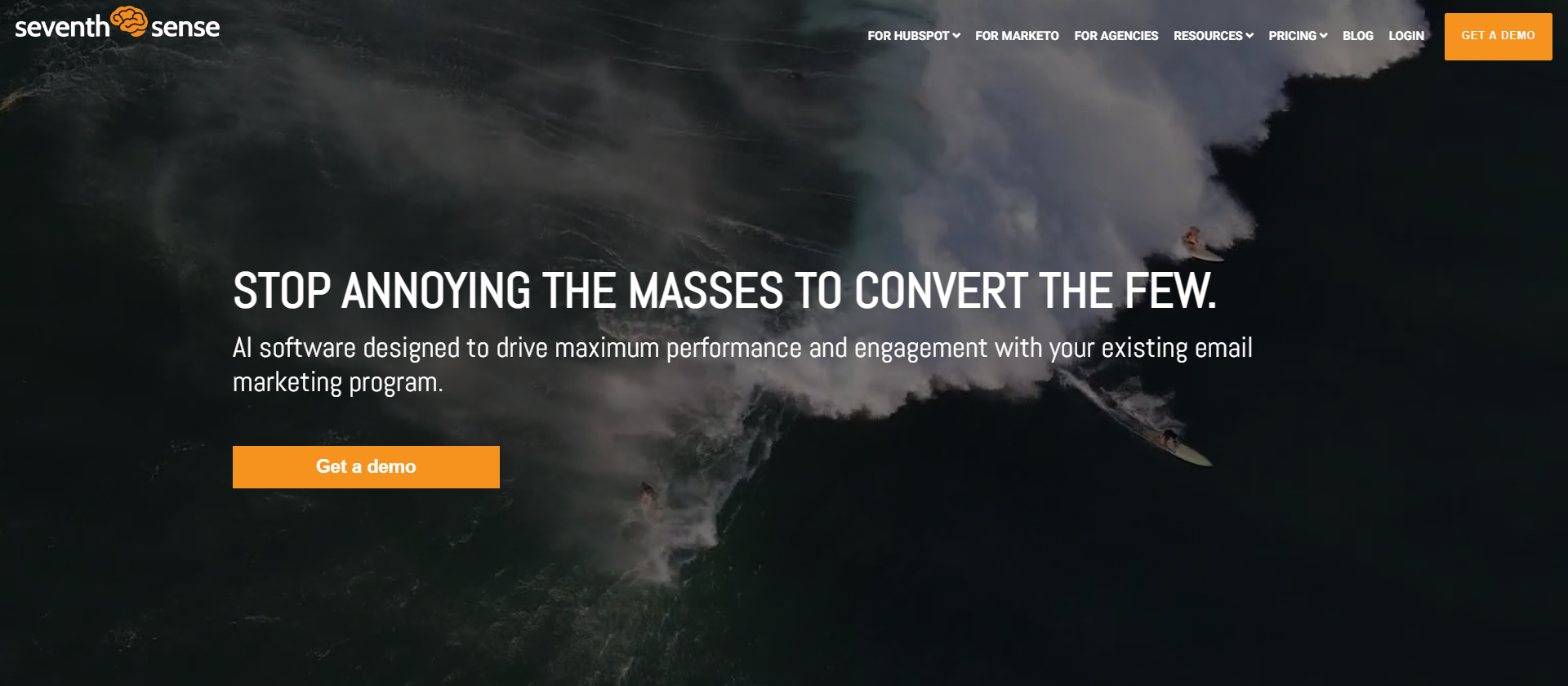
Seventh Sense is focused on helping those with email marketing campaigns achieve maximum performance and engagement in their existing campaigns. It starts with behavior profiling to help identify and qualify the most valuable leads to help marketers focus their outreach campaigns. It also provides suggestions to optimize email marketing campaigns by optimizing send times and email frequency.
The end goal is to maximize email deliverability by ensuring that marketers send the right emails to the right leads at the right times. This will lead to higher levels of engagement, improve open rates, and avoid frustrating non-qualified leads with spam. It also offers a free A/B test automation tool to assess and compare the performance of different email campaigns.
Conclusion
The global artificial intelligence (AI) market size was estimated at USD119.78 billion in 2022 and it is expected to hit USD1,591.03 billion by 2030 with an enrolled CAGR of 38.1% from 2022 to 2030. Many newcomers are attracted by its potential to Boost their marketing ROIs by making more sales and lowering costs. At the same time, existing AI users are continuing to invest to keep the competitive advantage that AI has given them. That means that, if you haven’t done it yet, it’s time to embrace the use of AI in marketing to not risk falling behind.
Optimize your content SEO with AI!
Write and perfect original content and fix all SEO and readability errors 10X faster with 10Web AI Writing Assistant✨
FAQ
What is AI-driven marketing?
How is AI used in marketing?
What are the benefits of using AI in marketing?
- Save time, money, and resources
- Free up human resources to focus on high-level, strategic work
- Improve and accelerate decision-making
- Test and optimize campaigns
- Scale marketing efforts
- Streamline and improve customer experiences
What are some AI marketing examples?
- Using machine learning algorithms to analyze customer data to identify patterns and predict behavior
- Developing chatbots using NLP, NLG, or LLM models to communicate with customers
- Automated individual-level personalized marketing campaigns.
- Using self-training AI and ML models to automate optimizing marketing campaigns over time.
What are the challenges of using AI in marketing??
Will AI replace marketers?
Get a head start on website creation with AI
Create a custom website tailored to your business needs 10X faster with 10Web AI Website Builder!












